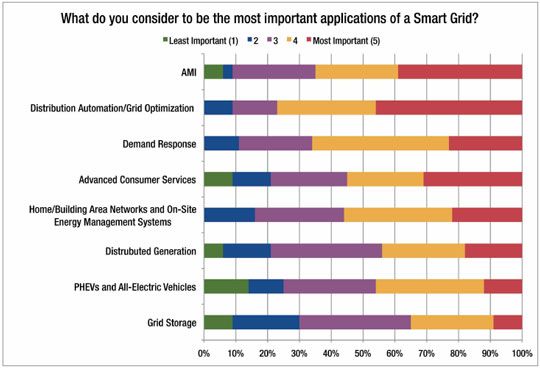The 2003 blackout that plunged an estimated 50 million people on the East Coast of the U.S. into darkness was caused by a tree (and a series of cascading failures along a number of transmission and distribution grids that were largely due to the actions taken by automatic protective controls). Are there ways to better optimize the grid, isolate faults, improve software-based alarm systems and generally deploy a more intelligent communications control plane to prevent this from happening?
The load (demand) on any network must be closely matched by the supply to avoid potentially damaging effects to the grid. A plethora of smart grid technologies, often collectively referred to as grid optimization and/or distribution automation, can be deployed to help mitigate a number of grid-related issues, including blackouts. In a recent GTM Research survey of North American utility smart grid executives, it was found that distribution automation/grid optimization was their number one priority in terms of smart grid applications, even though it's smart meters and Advanced Metering Infrastructure (AMI) that are getting the market buzz around initial deployments.

Source: GTM Research
Add in the escalating demand for electronics -- large TVs, PCs and data centers, electric cars -- and the transition from a relatively predictable, centralized power generation model to a more distributed architecture largely dominated by intermittent renewable energy sources, and the complexity of ensuring grid reliability only increases.
Robert Blohm, an independent consultant active in the North American Electric Reliability Corp., recently wrote an interesting piece for Public Utilities Fortnightly ("Green Blackouts?") in which he stated, "No amount of money spent on a smart grid or on expanding the transmission system will address this problem, while consequent administration pressure on the Federal Energy Regulatory Commission to fast track a solution risks backfiring into no solution at all."
(The problem he's referring to is the prospect of an increasing amount of renewable generation threatening grid reliability.)
Granted, distributed generation adds yet another variable of complexity to the equation, but really, "no amount of money" at all?
Do you think certain smart grid technologies can make power outages (or at least the length of their duration) a thing of the past?
Read more on this topic in a joint effort by General Electric Ecomagination and Greentech Media, and join the discussion here.



